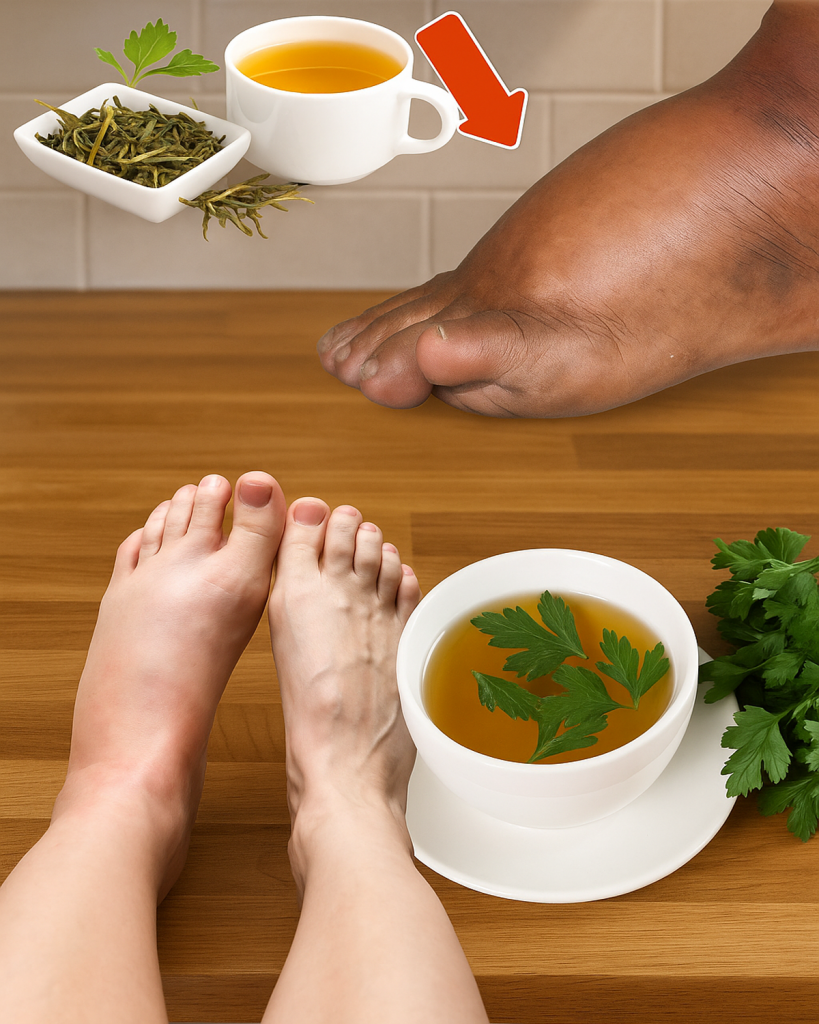Swollen legs, ankles, and feet—also known as edema—affect millions of people worldwide. In fact, studies estimate that nearly 20% of adults will experience some form of swelling due to fluid retention, circulation issues, or lifestyle habits. For many, it’s an uncomfortable problem that makes walking difficult, shoes tight, and daily life frustrating. While medications are often prescribed, natural remedies have been quietly used for generations with surprising effectiveness.
One of the most trusted solutions in traditional medicine is parsley tea. This humble herb, often seen only as a garnish on plates, hides powerful properties that may help the body naturally reduce excess water and improve circulation. But how exactly does parsley tea work, and why do so many people swear by it as a simple, affordable way to manage swelling?
In this article, we’ll uncover the science, tradition, and practical tips behind parsley tea. You’ll discover what happens when you drink it regularly, how to prepare it correctly, and why it may just become your go-to natural remedy for swollen legs and feet.

Understanding Swelling: Why It Happens
Before diving into parsley tea, it’s important to understand the causes of swelling. Swelling in the lower body usually occurs due to:
- Fluid retention (edema): The body holds on to excess water, often in the legs, ankles, and feet.
- Poor circulation: Blood flow slows, leading to pooling of fluids.
- Long hours of sitting or standing: Common in office workers, travelers, and service industry jobs.
- Medical conditions: Such as kidney problems, heart issues, or side effects from medication.
While serious causes should always be evaluated by a doctor, many cases of mild swelling can be improved with dietary and lifestyle changes—parsley tea being one of them.
Parsley: More Than Just a Garnish

Parsley is often overlooked, but it is packed with nutrients and compounds that support health. Just a handful contains:
| Nutrient | Benefit |
|---|---|
| Vitamin C | Antioxidant, supports circulation |
| Vitamin K | Helps with blood clotting and bone health |
| Potassium | Balances sodium, reduces water retention |
| Flavonoids | Antioxidant, anti-inflammatory |
These nutrients, combined with parsley’s natural diuretic properties, make it an excellent choice for those looking to manage swelling without relying solely on medications.
How Parsley Tea Helps With Swelling
Parsley tea works in a few key ways that may explain why people experience reduced swelling:
Natural Diuretic Effect
Parsley stimulates the kidneys to release excess fluid and sodium from the body. This gentle diuretic action helps reduce water buildup in the legs and ankles.

Anti-Inflammatory Properties
Flavonoids and antioxidants in parsley help calm inflammation, which often worsens swelling.
Circulation Support
Potassium in parsley helps regulate blood pressure and improves circulation, reducing the risk of fluid pooling in the lower body.
Case study: In traditional European medicine, parsley has long been used to manage edema. Today, herbalists still recommend parsley tea as a natural approach to easing mild swelling.
How to Make Parsley Tea at Home
Making parsley tea is simple, affordable, and requires only a few ingredients.
Ingredients:
- 1 handful of fresh parsley (or 2 tablespoons dried parsley)
- 2 cups of water
- Optional: lemon juice or honey for taste

Instructions:
- Boil the water in a pot.
- Add chopped fresh parsley (or dried parsley) to the boiling water.
- Cover and simmer for 5–7 minutes.
- Strain into a cup, add lemon or honey if desired, and drink warm.
Tip: For best results, drink 1–2 cups daily, preferably in the morning. Always start with small amounts to see how your body responds.
Other Health Benefits of Parsley Tea
Beyond reducing swelling, parsley tea offers several additional benefits:
- Supports kidney health by promoting detoxification.
- Freshens breath thanks to its natural oils.
- Provides antioxidants that may reduce oxidative stress.
- Boosts immune system with vitamin C.
- Aids digestion by reducing bloating and discomfort.
Many people who drink parsley tea regularly report not only less swelling but also improved energy and a lighter feeling overall.

Safety and Precautions
While parsley tea is natural, it should be used responsibly.
- Pregnant women should avoid large amounts, as parsley may stimulate the uterus.
- People with kidney disease should consult a doctor before using parsley tea.
- Medication interactions: If you are on diuretics, blood thinners, or other prescription drugs, speak with your healthcare provider first.
As with any natural remedy, moderation is key.
Conclusion
Parsley tea is more than an old-fashioned remedy—it’s a natural, nutrient-rich way to support the body in reducing swelling, improving circulation, and easing discomfort in the legs, ankles, and feet. Affordable and easy to prepare, it offers benefits that go beyond what most people expect from a simple kitchen herb.
Frequently Asked Questions
Can parsley tea really reduce swelling?
Yes, thanks to its natural diuretic and anti-inflammatory properties, many people experience relief.
How often should I drink it?
1–2 cups per day is usually enough. Start small and adjust based on your body’s response.
Are there any side effects?
In moderation, parsley tea is safe for most people. However, pregnant women and those with certain medical conditions should avoid it without medical guidance.
This article is for informational purposes only and should not replace professional medical advice. Always consult a healthcare provider before starting any new remedy or making significant changes to your diet.




